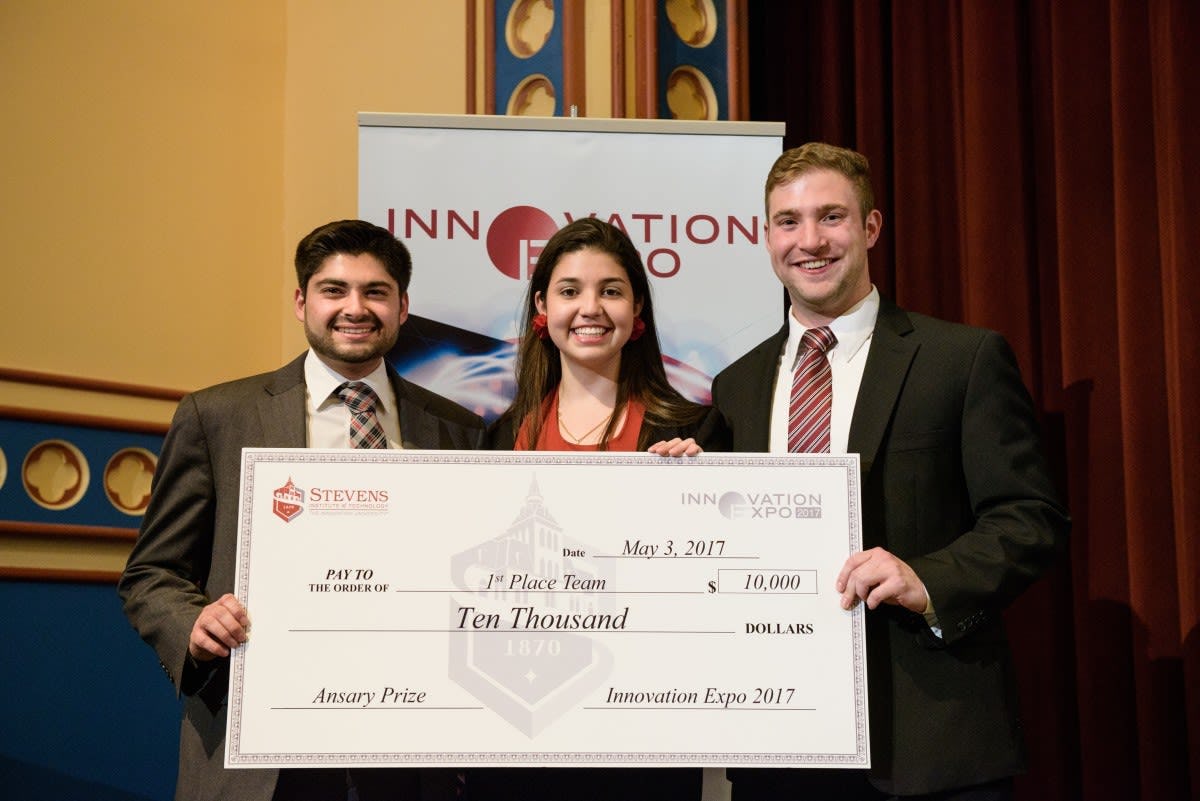Stevens Institute of Technology Team Named Finalist in Collegiate Inventors Competition
CerebroSense Brain Pulsatility Measurement Device Provides Better Brain Monitoring
November 3, 2017 Update:
The 2017 Collegiate Inventors Competition People’s Choice Award winner was CerebroSense from the Stevens Institute of Technology. Team members Maria V. De Abreu Pineda, Andrew Falcone and David Ferrara were awarded $1,000 for creating a device using ultrasonic sensing technology to provide safe, non-contact, real-time measurements during open-brain surgeries that can help reduce complications to the patient. Expo attendees had the unique opportunity to vote for the People’s Choice winner
A Stevens Institute of Technology Senior Design team has been named one of only six undergraduate finalists for the 2017 Collegiate Inventors Competition, which honors the nation’s top collegiate inventors. The students devised CerebroSense, a device that can monitor and measure exposed brain tissue from a distance, which reduces complications during and after open-brain surgery.
The Senior Design team, who have all graduated, includes David Ferrara, Andrew Falcone and Maria De Abreu Pineda. The trio worked in in collaboration with Dr. Glen Atlas '82, an anesthesiologist and adjunct clinical professor at Stevens, and biomedical engineering professor and program director Vikki Hazelwood.
During open-brain surgeries, the brain’s health is traditionally monitored by physically touching the exposed brain to feel for changes in size that indicate swelling, decreased blood flow or other issues requiring action. This touch carries a small risk of stroke, ischemia or other complications during or after surgery.
The team set out to find a better way to measure and report brain changes in real time — without physically touching it. CerebroSense can be quickly brought into an operating room and safely pointed at exposed brain tissue from a distance of two to 20 inches. Using ultrasonic sensing technology, it sends sound waves toward the surface of the brain and provides safe, non-contact, real-time measurements.
As part of the competition, the finalists will travel to Washington, D.C., for the event, which will take place from November 1-3. The esteemed panel of judges include National Inventors Hall of Fame (NIHF) inductees and leaders from the United States Patent and Trademark Office (USPTO). Winners and their advisors will be awarded cash and prizes ranging from $2,500 to $10,000
“It is inspiring to meet the Collegiate Inventors Competition Finalists and to witness their accomplishments, idealism and motivation,” said NIHF CEO Michael Oister. “By the time the competition at the United States Patent and Trademark Office is over, they have all benefitted greatly by developing stronger go-to-market strategies, creatively solving challenges and problems, and gaining a much greater understanding of our patent, trademark and intellectual property systems.”
"This project has the potential to significantly improve outcomes in craniotomy surgeries," explains biomedical engineering professor and program director Vikki Hazelwood, who advises the team. "These students have embraced the opportunity that this project offers to extend far beyond the classroom. It's a great example of our academic ideal, where students impact society while they are learning."
CerebroSense was awarded first prize in an undergraduate-poster competition at Johnson & Johnson's 2017 Engineering Showcase and the Senior Design team also won the Stevens 2017 Innovation Expo Elevator Pitch Competition, which awarded the team $10,000.



